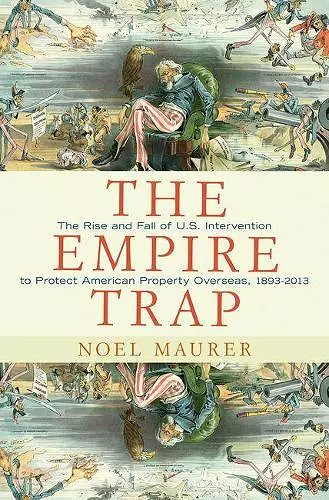The Empire Trap
The Rise and Fall of U.S. Intervention to Protect American Property Overseas, 1893-2013
Format:Hardback
Publisher:Princeton University Press
Published:6th Sep '13
Currently unavailable, and unfortunately no date known when it will be back

Throughout the twentieth century, the U.S. government willingly deployed power, hard and soft, to protect American investments all around the globe. Why did the United States get into the business of defending its citizens' property rights abroad? The Empire Trap looks at how modern U.S. involvement in the empire business began, how American foreign policy became increasingly tied to the sway of private financial interests, and how postwar administrations finally extricated the United States from economic interventionism, even though the government had the will and power to continue. Noel Maurer examines the ways that American investors initially influenced their government to intercede to protect investments in locations such as Central America and the Caribbean. Costs were small--at least at the outset--but with each incremental step, American policy became increasingly entangled with the goals of those they were backing, making disengagement more difficult. Maurer discusses how, all the way through the 1970s, the United States not only failed to resist pressure to defend American investments, but also remained unsuccessful at altering internal institutions of other countries in order to make property rights secure in the absence of active American involvement. Foreign nations expropriated American investments, but in almost every case the U.S. government's employment of economic sanctions or covert action obtained market value or more in compensation--despite the growing strategic risks. The advent of institutions focusing on international arbitration finally gave the executive branch a credible political excuse not to act. Maurer cautions that these institutions are now under strain and that a collapse might open the empire trap once more. With shrewd and timely analysis, this book considers American patterns of foreign intervention and the nation's changing role as an imperial power.
"[T]his is a very good book--cogently argued, detailed, and well-written."--Politics Reader "The Empire Trap represents an important addition to scholarship on twentieth century U.S. foreign policy. Maurer convincingly demonstrates that American investments in foreign countries were repeatedly threatened by expropriating governments and that in countless instances the United States utilized a variety of methods to protect those investments or to ensure fair compensation when they were lost."--Jeffrey Malanson, Enterprise & Society "It is impressive not only for its scope ... but also for its attention to detail in each of the cases presented. Most important, Maurer's analysis brilliantly captures a big picture that challenges much of the conventional wisdom showing how a small number of private investors draw government into one international quagmire after another because it was the only way they could have their property rights enforced."--Alan Dye, EH.Net "This is an exemplary work of historical social science, shedding light on many debates within the international relations literature."--Michael J. Lee, Perspectives on Politics
ISBN: 9780691155821
Dimensions: unknown
Weight: 907g
568 pages